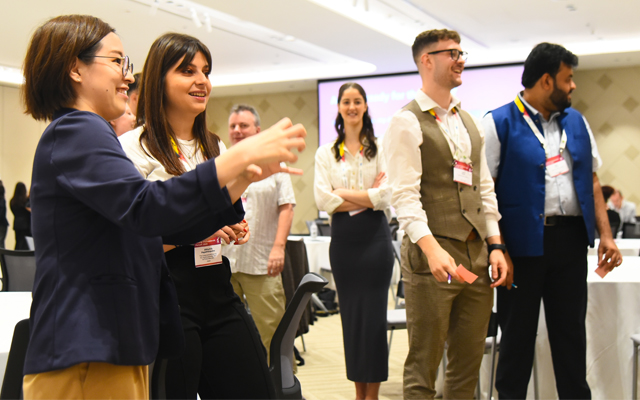Young professionals gathered on November 11 to explore what elements will define the leading business destinations of the future. A total of 66 people from 28 countries gathered for the ICCA Young Professionals Forum 2023, a workshop that aims to shape the future of the industry.
Leading the session was Ivo J Franschitz, managing director of ENITED. He said: “After what we’ve experienced in the last few years coming out of Covid, we need to rethink what the perfect destination for business events may look like.”
He noted that many business events shifted online during the pandemic, and there was a lot of talk about what the “new normal” would be when the world emerged.

He added: “We talked about it for a few years but fell back into old habits. Now, we’re talking about the next normal and that’s something we want to create. It’s an opportunity our industry has.”
Gea van Beek, global meetings coordinator at Sky Team, said safety is a key element for destinations wanting to attract events. She commented: “It’s a big thing, especially being a woman. This goes hand-in-hand with accessibility and transport.”
Other buzzwords that emerged were innovation, inclusivity, fun, flexible, connectivity, wellness, equality and technology.
Franschitz noted that the business events space needs to push beyond delivering traditional norms. Today, people are seeking exceptional experiences.
He explained: “People want to have that lasting experience, whether they’re joining a conference or corporate event.”
Another strong element was creating events that add value and involve the local community. Iain Bitran, executive director, International Society for Professional Innovation Management (ISPIM), said: “In terms of what we look to do is make some kind of local impact – but how do we measure that?”
He gave an example of when ISPIM worked with a local caterer in Slovenia; to reduce food waste, 10 per cent of food was held back and donated to a local charity.
ISPIM is organising an event in Estonia next year and has recommended a similar scheme. Inspired by ISPIM, authorities there have now written into law that all caterers must withhold 10 per cent of food to donate.
Stephanie Cheung, account director at New York-based Market D, remarked: “Organisers want to know what will change locally if I bring my conference to you. A must-have for destinations of the future is they should no longer try and get us for the sake of getting us. It shouldn’t just be about economic impact and taking the bid to have more heads in beds.”
Cheung added that another key element that needs to change is the bidding process.
She said: “Many times, we spend a long time on bidding. We wait months and get a ‘no’ without any reason why.”
She recommended an ethical framework be drafted that encourages a more transparent process that associations can use as a guideline and help them “be more efficient and effective” with bids.
This would avoid situations whereby the boards spend a long time working on a bid and have members cast votes, only to have the destination decision overturned because “one of their wives wanted to go to another destination”. “Internal politics” should not influence decisions, Cheung stressed.





















